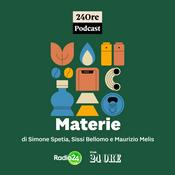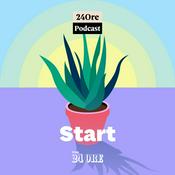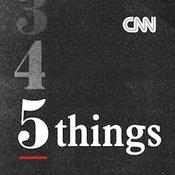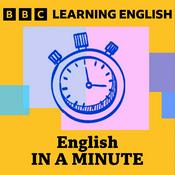401 episodi

A journalist’s life in Israel
13/04/2024 | 27 min
What is it like to work in Jerusalem right now? BBC journalist Shaina Oppenheimer shares her experience of living in Israel and monitoring the conflicting narratives published on Israeli and Palestinian media. Plus, BBC Mundo's Alicia Hernandez explains why Equatorial Guinea is the only African country which has Spanish as one of its official languages and shares the unusual local Spanish words she discovered.Produced by Caroline Ferguson and Alice Gioia For future episodes of The Fifth Floor, you can now listen every week on The Documentary podcast. Just search for The Documentary, wherever you get your BBC podcasts.(Photo: Faranak Amidi. Credit: Tricia Yourkevich)

My Ramadan
06/04/2024 | 27 min
Ramadan is the ninth month of the Islamic calendar. It’s a period of prayer, celebrations and community gatherings and Muslims worldwide observe it by fasting from dawn to sunset. As this year’s Ramadan draws to a close, Faranak Amidi is joined by three BBC World Service colleagues who share their personal experiences and the stories that made headlines in their countries during this year’s celebrations. Asif Farooqi, Aalia Farzan and Deena Easa have been looking at how conflict, natural disasters and the cost-of-living crisis are impacting people in Pakistan, Afghanistan and Gaza. Plus... Ramadan cricket, why do people want to get married during the Holy Month, and the TV series that everyone’s talking about.Produced by Alice Gioia and Caroline Ferguson(Photo: Faranak Amidi. Credit: Tricia Yourkevich)

From prison to president
29/03/2024 | 40 min
After an election held just days after his release from prison, Bassirou Diomaye Faye is set to become Senegal's next president, and at 44, the youngest in the country’s history. From Dakar, the BBC's Khadidiatou Cissé and Thomas Naadi tell us more about the new Senegalese leader.Banksy's new neighbour BBC Mundo's Carlos Serrano shares his experience of finding himself at the centre of a big news story, after a Banksy mural was painted outside his apartment. Kashmiri carpet weavers In Indian-administered Kashmir, an ancient code called 'talim' was traditionally used to pass on complex patterns to carpet weavers. BBC India's Priti Gupta reports on how computers and AI are changing this, and the impact on the traditional carpet industry. Brazil’s forest-friendly rubber tappers The growing interest in sustainable ways of exploiting the Amazon rainforest has created new opportunities for Brazil's traditional rubber tappers, who can get enhanced payments for preserving the areas where they work. Julia Carneiro reported for BBC Brasil on how the scheme works. The Big Korean Dictionary The Korean language has been diverging between North and South Korea since the peninsula was divided. To keep track of the changes, an inter-Korean dictionary project was set up in 2005, with linguists from both sides. But worsening relations mean the project was suspended in 2015, as BBC Korean's Seonwook Lee reports.Come with us! The Fifth Floor is moving and we would love it if you can join us. You can now find all our episodes on The Documentary, the home of original, global storytelling, from the BBC World Service. Search for The Documentary, wherever you found this podcast, and don’t forget to subscribe or follow.(Photo: Bassirou Diomaye Faye. Credit: Getty)

Women's radio in Afghanistan
22/03/2024 | 41 min
As a new school year starts in Afghanistan, 330,000 more girls will be excluded from secondary education, one of the ways in which women and girls are increasingly confined to their homes under the Taliban regime. In light of this, BBC Media Action is running the Women’s Voice radio project, training women to make programmes for other women on vital topics like health, work and education. Getti Sediqi is one of the trainers in Kabul. Isabel, the giant armadillo The giant armadillo, found only in Latin America, has been called a "ghost species" because it's so rarely seen. But thanks to one particular armadillo in Brazil, called Isabel by researchers, many discoveries have now been made, as BBC Brasil’s Giulia Granchi reports.Haji Firouz: Nowruz controversy in Iran Iran traditionally heralds its New Year with a festive figure known as Haji Firouz. The jester-like character sings and dances through the streets but has become controversial because performers blacken their faces and hands, a practice many find highly offensive. Now the character is being used as a form of protest to highlight the ongoing struggle for women's rights in Iran, as BBC Monitoring's Sarbas Nazari explains. No bidders for Aung San Suu Kyi's iconic house A failed attempt was made this week to auction the lakeside home of the detained Burmese leader, Aung San Suu Kyi. A court had ordered its sale after a long drawn-out legal battle between Suu Kyi and her brother Aung San Oo. BBC Burmese editor Soe Win Than explains the significance of this house, and the possible reasons why no bidders showed up.The Commercial Bank of Ethiopia's money glitch Ethiopia's largest commercial bank is trying to recoup millions of dollars' worth of currency after a 'system problem' allowed customers to withdraw unlimited funds. It's been reported that a large portion of the cash was withdrawn by students as news of the banking glitch spread around universities. Kaleb Moges tells us about developments. (Photo: Nadia Shekib, journalist, producer and news editor at Radio TV Oboor. Credit: BBC Media Action)

Israel’s Orthodox Jews and the army
15/03/2024 | 40 min
The war in Gaza is forcing Israeli society to confront a long-standing conflict over who serves in the army. Ultra-Orthodox Jews enjoy an exemption, but many Israelis now say this should end. Both sides took to the streets to protest, while the Israeli Supreme Court hears a case related to this matter, as BBC Arabic’s Michael Shuval reports. Ukraine's Ushanka hat sell off The Ukrainian government plans to auction 40,000 ushanka hats it bought in the early 2000s. The warm winter hats became popular after the 1917 Russian revolution and spread across the Soviet Union for leaders and civilians alike. BBC Ukrainian's Dmytro Vlasov explores the history of the hat, and why they're being sold now. Thailand's cannabis law reversal Thailand’s new government plans to reverse a law decriminalising the recreational use of cannabis which was passed only 18 months ago. BBC Thai’s Tossapol Chaisamritpol explains the societal pressures behind the switch, and met some of the growers who will be affected if the ban goes ahead. China’s looming pension crisis As China’s birthrate declines and a growing number of people reach old age and retirement, the country faces a looming crisis – the labour force will be smaller, and the cost of caring for the elderly will be higher. For BBC Chinese, Chen Yan explores the potential impact on the economy – and, in the words of one expert, on China’s destiny. Observing the 'Day of Silence' and Ramadan in Indonesia Nyepi or 'Day of Silence' is an important Indonesian public holiday, mainly observed in Bali. It's a day reserved for quiet self-reflection, and this year, the Hindu celebration coincided with the first day of Ramadan. BBC Indonesian's Amahl Azwar met some of those making sure the two forms of worship can run smoothly together.(Photo: Ultra-Orthodox Jewish men protest against proposed end to military conscription exemption. Credit: Ronen Zvulun/Reuters)
Altri podcast di Notizie
Podcast di tendenza in Notizie
Su Fifth Floor
Ascolta Fifth Floor, The Daily e molti altri podcast da tutto il mondo con l’applicazione di radio.it
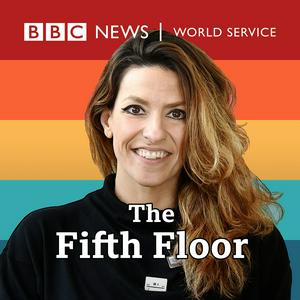
Scarica l'app gratuita radio.it
- Salva le radio e i podcast favoriti
- Streaming via Wi-Fi o Bluetooth
- Supporta Carplay & Android Auto
- Molte altre funzioni dell'app
Scarica l'app gratuita radio.it
- Salva le radio e i podcast favoriti
- Streaming via Wi-Fi o Bluetooth
- Supporta Carplay & Android Auto
- Molte altre funzioni dell'app


Fifth Floor
scarica l'app,
ascolta.


















